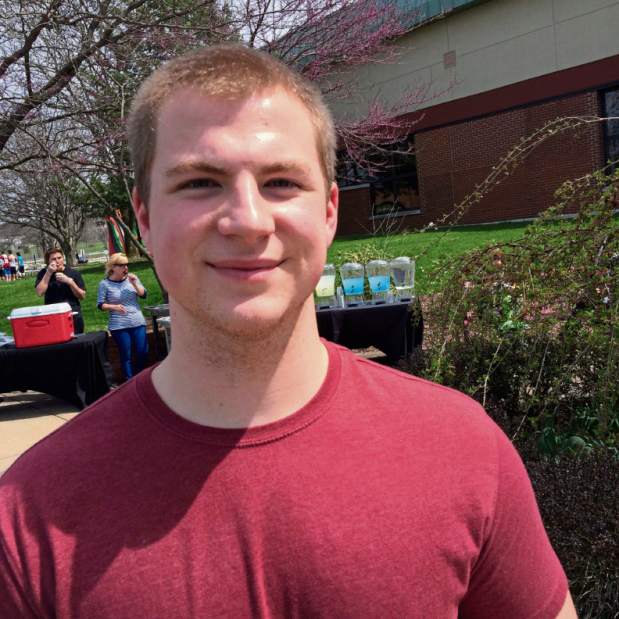Pennsylvanians envious of N.Y.'s free college tuition
What a difference a border can make.
While officials at Pennsylvania's public universities and colleges worry about backfilling deficits, New York Gov. Andrew Cuomo and that state's general assembly have agreed on a budget package to provide free tuition to working-class New York residents who are full-time students at state public universities and community colleges.
The announcement left many students at Pennsylvania public colleges and universities, where tuition has been ticking up year after year, enviously looking northward.
“If New York can do it, I can't see why Pennsylvania can't,” said Ben McCoy, 20, of Hempfield.
Like many cash-strapped Pennsylvania students, McCoy struggles to juggle work and school. He works the 10 p.m. to 4 a.m. shift at UPS to help cover costs at Westmoreland County Community College, where he is a full-time student. McCoy studies information science and plans to transfer to the University of Pittsburgh at Greensburg to finish his bachelor's degree.
Public higher education in New York — the first state to offer free tuition at public four-year universities and community colleges — has always been less costly than it is in Pennsylvania. According to the College Board, in-state tuition and fees at New York public four-year schools averaged $7,710 a year, compared to an average of $10,437 for tuition and mandatory fees at one of Pennsylvania's 14 state-owned universities.
A cursory check of New York community colleges revealed students pay about $4,500 a year in tuition and fees. By comparison, full-time students at WCCC pay about $5,100.
Ron Cowell, a former Pennsylvania lawmaker who oversees the Education Policy and Leadership Center, said the contrast between higher education policies in the two states is stark.
“Much of the problem is that state policymakers don't think about higher education or secondary education in Pennsylvania as part of a bigger strategy for development of the state,” Cowell said. “There has just been an absence of that kind of strategic thinking. That has been a historical issue, although it's gotten worse in the last few years.”
Cuomo estimates New York will spend an extra $163 million on free college tuition in the first year. He said about 940,000 New York families will be eligible for the program. It is being phased in this fall for families with total incomes of $100,000 a year or less and eventually will be expanded to all students with family incomes of $125,000 or less.
There are several caveats attached to the program. Students, for example, will be required to finish either a two-year or four-year program on time and must commit to remaining in state for either two or four years depending on the program from which they graduated. If they leave, the full grant retroactively becomes a loan.
“It would be nice for us in the future if we had something like that. It's easier when you don't have to take all that debt,” said Haley Noel, 19, of Hempfield, who works 30 hours a week and is taking out loans to help cover her costs at WCCC, where she is a full-time student.
Jacob McCaskill, 18, of Belle Vernon echoed her concerns. But McCaskill, who is working 35 hours a week as a cook and attending school full time, said he probably works harder because he has to pay his own way.
“If they did something like (New York), I might get lazy,” he said.
That's something few students can afford to do in Pennsylvania. Quoting a recent study, Cowell said the state ranks near the top of the nation in the price of tuition at public institutions and the level of indebtedness among graduates.
New York's largesse, funded in part by higher taxes on those with incomes of more than $1 million, occurs as officials at Pennsylvania's state-owned universities struggle with declining enrollment and stagnant subsidies. Pennsylvania has yet to restore the slashes to state support made in 2011.
Joni Finney, a professor in the graduate school of education and director of the institute for research on higher education at the University of Pennsylvania, said New York's decision to support tuition-free higher education had been percolating through public policy circles in the state for some time.
“It sends an incredibly powerful message to young people and working young adults that there is opportunity available in New York,” she said.
The decision to extend free tuition to higher-income families ignores the fact that tuition represents only a portion of the costs of attending college and the disproportionate burden those at lower income levels must carry even to attend community college, she said.
“It seems that rather than go up so far on the income scale, it would make sense to cover full costs for students in that sector and trying to cover full costs for the first two years of public college,” she said.
Debra Erdley is a Tribune-Review staff writer. Reach her at 412-320-7996 or derdley@tribweb.com.



